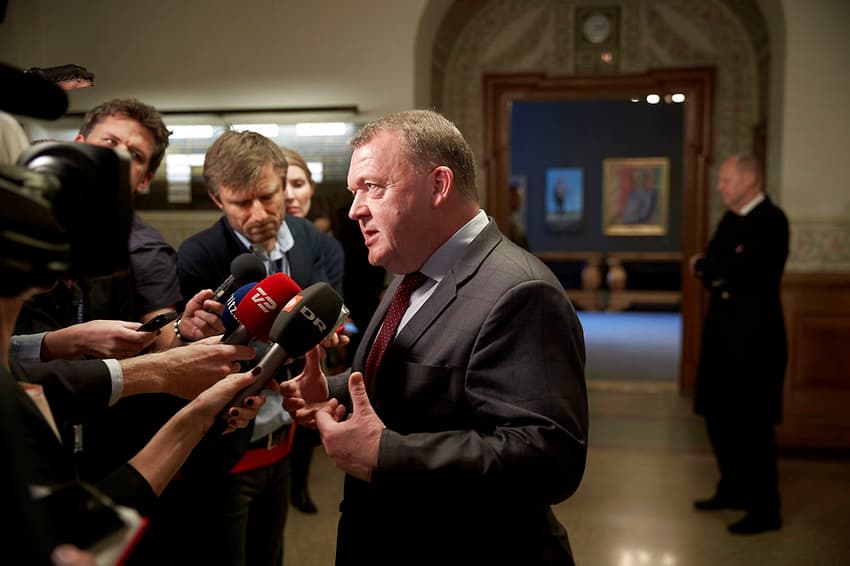'I decide' who goes to UN meeting: Danish PM

At least one Danish minister will be present at next week’s UN Global Compact for Safe, Orderly and Regular Migration at meetings in Morocco.
That means that either Minister for Immigration and Integration Inger Støjberg or Minister for International Development Ulla Tørnæs could attend, despite both having recently stated they would not be going.
Rasmussen said after a meeting at the Christiansborg parliament Wednesday that the final decision on the matter rested with him.
“I’m currently looking at how other countries are represented and we will then send a minister in line with that. I decide who will be sent to the meeting,” Rasmussen said.
“It’s possible that it could be the minister for development or the minister for integration. It might be the foreign minister [Anders Samuelsen, ed.]. It could be myself,” he added.
“This comes down to me making a decision when I have evaluated what others are doing and when we have looked at people’s schedules,” he said.
The identity of Denmark’s representative at the meeting will be resolved in the coming days, the PM said.
Both Støjberg and Tørnæs were reported earlier this week to have pulled out of the meeting after both were initially scheduled to go.
The UN compact marks the first time the world organization has agreed on a list of global objectives to tackle the challenges involved in migration for individual migrants, and at the same time to maximize benefits for the countries taking in immigrants.
A legally non-binding agreement, it includes a stated intention to give vulnerable migrants equal status to refugees and to work against economic support for media that spread intolerant views on migrants.
The text also provides for easier repatriation of migrants and is intended to help organize migration more effectively.
Not every country supports it. Among others, the United States, Hungary, Austria, the Czech Republic, Switzerland and Slovakia have spoken out against the pact.
In Denmark, anti-immigration Danish People’s Party leader Kristian Thulesen Dahl has opposed Denmark’s participation, saying the compact will oblige Denmark to make concessions to migrants.
But Rasmussen said that Denmark would not lose any sovereignty through signing the compact.
“I want to be clear: the UN migration compact is not legally binding,” he said.
“It will not create new laws in Denmark. Nor does the declaration take away our sovereignty over immigration.
“It does not change on comma of Danish immigration policy,” he said.
Rasmussen said it was important Denmark said the declaration in order to demonstrate international responsibility.
“The declaration is an important symbol of the importance of multilateralism in a world in which that is under threat. It is a symbol of whether or not you want to be part of international partnerships,” he said.
READ ALSO: Denmark's immigration minister to skip international meeting on UN's migration pact
Comments
See Also
That means that either Minister for Immigration and Integration Inger Støjberg or Minister for International Development Ulla Tørnæs could attend, despite both having recently stated they would not be going.
Rasmussen said after a meeting at the Christiansborg parliament Wednesday that the final decision on the matter rested with him.
“I’m currently looking at how other countries are represented and we will then send a minister in line with that. I decide who will be sent to the meeting,” Rasmussen said.
“It’s possible that it could be the minister for development or the minister for integration. It might be the foreign minister [Anders Samuelsen, ed.]. It could be myself,” he added.
“This comes down to me making a decision when I have evaluated what others are doing and when we have looked at people’s schedules,” he said.
The identity of Denmark’s representative at the meeting will be resolved in the coming days, the PM said.
Both Støjberg and Tørnæs were reported earlier this week to have pulled out of the meeting after both were initially scheduled to go.
The UN compact marks the first time the world organization has agreed on a list of global objectives to tackle the challenges involved in migration for individual migrants, and at the same time to maximize benefits for the countries taking in immigrants.
A legally non-binding agreement, it includes a stated intention to give vulnerable migrants equal status to refugees and to work against economic support for media that spread intolerant views on migrants.
The text also provides for easier repatriation of migrants and is intended to help organize migration more effectively.
Not every country supports it. Among others, the United States, Hungary, Austria, the Czech Republic, Switzerland and Slovakia have spoken out against the pact.
In Denmark, anti-immigration Danish People’s Party leader Kristian Thulesen Dahl has opposed Denmark’s participation, saying the compact will oblige Denmark to make concessions to migrants.
But Rasmussen said that Denmark would not lose any sovereignty through signing the compact.
“I want to be clear: the UN migration compact is not legally binding,” he said.
“It will not create new laws in Denmark. Nor does the declaration take away our sovereignty over immigration.
“It does not change on comma of Danish immigration policy,” he said.
Rasmussen said it was important Denmark said the declaration in order to demonstrate international responsibility.
“The declaration is an important symbol of the importance of multilateralism in a world in which that is under threat. It is a symbol of whether or not you want to be part of international partnerships,” he said.
READ ALSO: Denmark's immigration minister to skip international meeting on UN's migration pact
Join the conversation in our comments section below. Share your own views and experience and if you have a question or suggestion for our journalists then email us at [email protected].
Please keep comments civil, constructive and on topic – and make sure to read our terms of use before getting involved.
Please log in here to leave a comment.